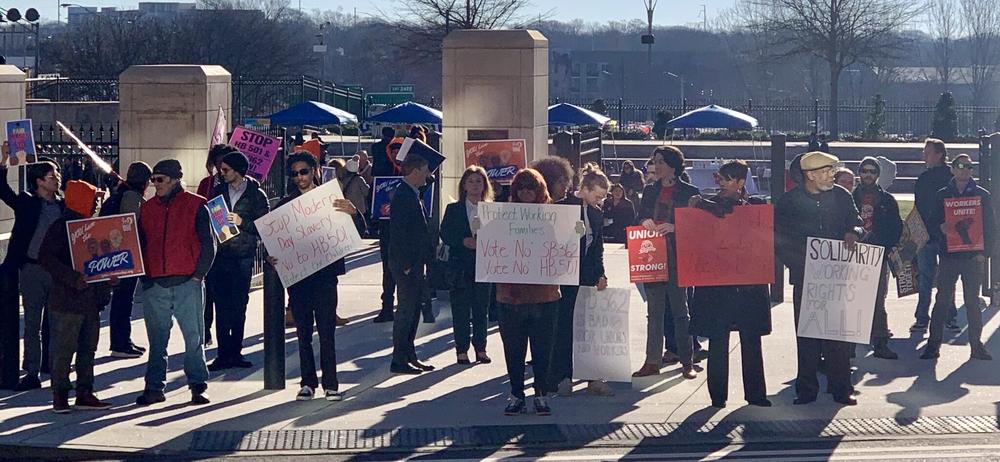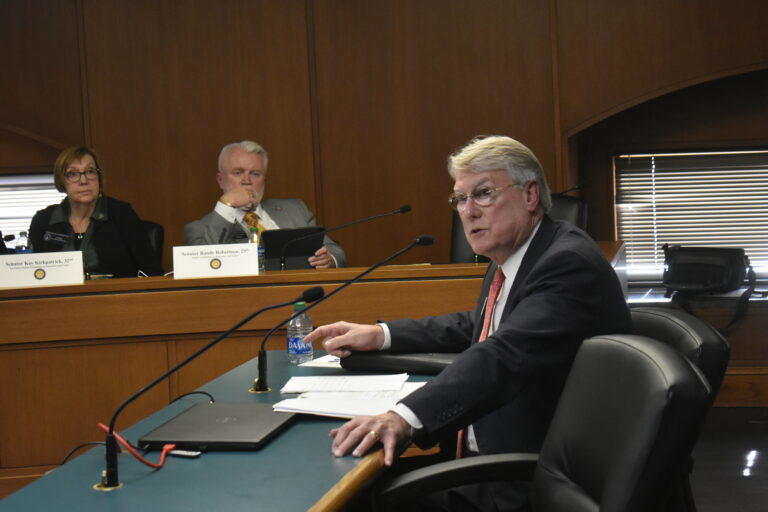
Caption
Pro-labor protesters gather outside the Georgia Capitol Jan. 30, 2024.
Credit: Stanley Dunlap / Georgia Recorder

Pro-labor protesters gather outside the Georgia Capitol Jan. 30, 2024.
A bill backed by Gov. Brian Kemp aimed at making it more difficult for labor unions to come to Georgia took a step toward becoming law Wednesday, passing through the Senate Insurance and Labor Committee 4-3 on party lines.
Brunswick Republican Sen. Mike Hodges’ Senate Bill 362 would bar new businesses opening up in Georgia from receiving state incentives if they recognize union representation without first holding a secret ballot rather than a card check, another method of organizing that generally makes it easier to form a union. It would not change anything for unions already in Georgia.
“By this bill, if any company prospectively executes an agreement with the state to receive certain economic development incentives, the company must agree to not voluntarily grant recognition rights for the employees based on card checks, if the selection of a bargaining representative may instead be conducted through a secret ballot,” Hodges said.
Hodges said the bill would not apply in cases in which a business has an existing labor agreement that states that future votes will be done by card check.
Labor attorney Nicolas Stanojevich argued that the bill calls on the state to take on authority granted to the federal government’s regulations on how labor organizations can be formed.
“Where the federal government chooses to enter into an area and regulate in that area through legislation, any other state efforts to change the way that that regulation works or the relations between parties under that law is preempted because it frustrates the entire federal purpose and undercuts the supremacy of federal law,” he said.
Hodges argued that the bill does not preempt the federal government because businesses can choose to turn down state incentives.

Sen. Mike Hodges presents his union bill supported by Gov. Brian Kemp at a Senate committee hearing in January 2024.
Union membership remained stagnant at about 10% in 2023, according to the Bureau of Labor Statistics, as new non-union jobs outpaced union ones. At the same time, approval of labor unions has grown in recent years, peaking at 71% in 2022, according to Gallup polling, the highest approval rating in the Gallup data since 1965. In 2023, 67% of respondents told Gallup they approved of labor unions and 29% disapproved.
Last year was the most active year for major labor disputes in more than two decades, according to Pew Research, and big labor strikes like Hollywood actors and writers, auto and health workers made headlines around the country.
Last August, 61% of those asked by Gallup said labor unions mostly help the economy in general, while 36% said they mostly hurt the economy.
Only 5.4% of Georgia workers were represented by unions in 2022, according to the U.S. Bureau of Labor Statistics, down from 5.8% the year before. That’s lower than all but six other states.
Speaking at an event for business leaders last month, Gov. Brian Kemp said he wants to keep major work stoppages out of Georgia.
“Last year we saw just how damaging anti-business actions are for workers and the economy,” he said. “The largest strikes of 2023 that lasted just six weeks cost the American economy over $9 billion and more than 75,000 jobs.”
“The people orchestrating these actions are partisan activists who want nothing more than to see the free market brought to a screeching halt, businesses both small and large go under, and economic growth and opportunity to be dictated by the heavy hand of government — not job creators,” he added.
Republicans on the committee agreed.
“It simply says that if they want to utilize Georgia taxpayer funds, they need to provide privacy in these elections,” said Athens Republican Sen. Bill Cowsert. “And I’m amazed that the representatives of the employees aren’t clamoring for this. Because by having a private ballot, just like we do in our elections, it keeps the companies from bullying the people or terminating or punishing people that want union representation.”
But Georgia union leaders clamored in the opposite direction, calling the bill a sign that the government cares more about helping owners make more money than helping workers get by.
“This anti-union legislation falls right in the path of everything else that the state has done,” said Sandra Williams, president of Atlanta North Georgia Labor Council, referencing issues including education funding and Medicaid expansion. “You don’t care about people like myself, Black, brown, people that don’t have much income. You don’t care about them. They are chattel in this state.”
Federal data show union membership is higher among Black workers at 11.8% compared to 9.8% for white workers.
Georgia State Council of Machinists President James Clements said there’s an open invitation for Kemp to attend the union’s meeting in Atlanta this month. He said the bill will likely cost taxpayers hundreds of thousands of dollars in lawsuits against the state and places the government on the wrong side of public opinion.
“A majority of Americans would join a union right now if they could, and working people across all sectors of the economy are organizing like never before,” he said. “The new era of the labor movement is here, and SB 362 is evidence that Gov. Kemp and GOP lawmakers are fighting to slow union growth.”
This story comes to GPB through a reporting partnership with Georgia Recorder.